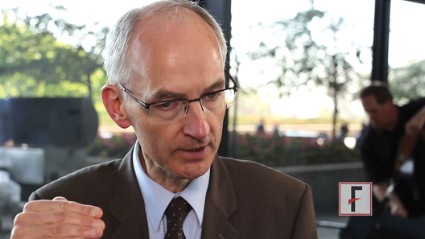User login
CHICAGO – Adding the recently approved stomach cancer drug, ramucirumab (Cyramza) to docetaxel reduced the risk of death in second-line, non–small cell lung cancer by 14% in the phase III REVEL study.
This is the first therapy in roughly a decade to improve the outcome of lung cancer patients in the second-line setting, according to study author Dr. Maurice Perol, head of thoracic oncology at Cancer Research Center of Lyon, France.
In addition, the recombinant human monoclonal antibody showed benefits in nonsquamous carcinoma as well as the squamous subtype, where treatments are limited.
Still, the median survival gain of just 1.4 months did not impress all at the annual meeting of the American Society of Clinical Oncology, where the study was highlighted in a press briefing before its formal presentation.
To hear Dr. Perol wade through the data and controversy, listen to our interview online.
The study was supported by ImClone, a subsidiary of Eli Lilly, which markets ramucirumab. Dr. Perol reported serving as a consultant or adviser with Lilly, Pfizer, Roche, Boehringer Ingelheim, and Genentech.
The video associated with this article is no longer available on this site. Please view all of our videos on the MDedge YouTube channel
CHICAGO – Adding the recently approved stomach cancer drug, ramucirumab (Cyramza) to docetaxel reduced the risk of death in second-line, non–small cell lung cancer by 14% in the phase III REVEL study.
This is the first therapy in roughly a decade to improve the outcome of lung cancer patients in the second-line setting, according to study author Dr. Maurice Perol, head of thoracic oncology at Cancer Research Center of Lyon, France.
In addition, the recombinant human monoclonal antibody showed benefits in nonsquamous carcinoma as well as the squamous subtype, where treatments are limited.
Still, the median survival gain of just 1.4 months did not impress all at the annual meeting of the American Society of Clinical Oncology, where the study was highlighted in a press briefing before its formal presentation.
To hear Dr. Perol wade through the data and controversy, listen to our interview online.
The study was supported by ImClone, a subsidiary of Eli Lilly, which markets ramucirumab. Dr. Perol reported serving as a consultant or adviser with Lilly, Pfizer, Roche, Boehringer Ingelheim, and Genentech.
The video associated with this article is no longer available on this site. Please view all of our videos on the MDedge YouTube channel
CHICAGO – Adding the recently approved stomach cancer drug, ramucirumab (Cyramza) to docetaxel reduced the risk of death in second-line, non–small cell lung cancer by 14% in the phase III REVEL study.
This is the first therapy in roughly a decade to improve the outcome of lung cancer patients in the second-line setting, according to study author Dr. Maurice Perol, head of thoracic oncology at Cancer Research Center of Lyon, France.
In addition, the recombinant human monoclonal antibody showed benefits in nonsquamous carcinoma as well as the squamous subtype, where treatments are limited.
Still, the median survival gain of just 1.4 months did not impress all at the annual meeting of the American Society of Clinical Oncology, where the study was highlighted in a press briefing before its formal presentation.
To hear Dr. Perol wade through the data and controversy, listen to our interview online.
The study was supported by ImClone, a subsidiary of Eli Lilly, which markets ramucirumab. Dr. Perol reported serving as a consultant or adviser with Lilly, Pfizer, Roche, Boehringer Ingelheim, and Genentech.
